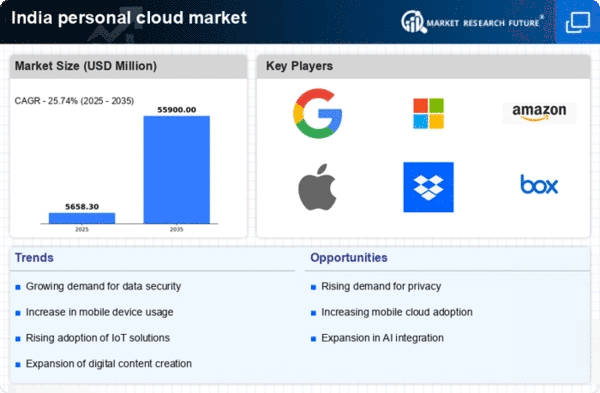Increased Adoption of Remote Work
The shift towards remote work in India has catalyzed the demand for personal cloud solutions. As organizations embrace flexible work arrangements, employees require reliable access to files and applications from various locations. The personal cloud market is witnessing a notable increase in users seeking secure and efficient ways to store and share data remotely. Reports indicate that around 70% of companies in India have adopted hybrid work models, which necessitate robust cloud solutions. This trend not only enhances productivity but also drives the need for personal cloud services that ensure data accessibility and collaboration. Consequently, the personal cloud market is likely to experience sustained growth as more individuals and businesses recognize the advantages of cloud-based solutions in a remote work environment.
Growing Mobile Internet Penetration
The increasing penetration of mobile internet in India is a crucial driver for the personal cloud market. As of 2025, mobile internet users in India are projected to reach approximately 900 million, representing a growth of around 30% from previous years. This surge in connectivity enables users to access personal cloud services seamlessly, facilitating data storage and sharing on-the-go. The personal cloud market is likely to benefit from this trend, as more individuals rely on mobile devices for their daily activities. Furthermore, the rise of affordable smartphones has made it easier for users to adopt cloud solutions, thereby expanding the customer base for personal cloud services. This growing mobile internet penetration appears to be a significant factor in shaping the future landscape of the personal cloud market in India.
Emergence of Smart Home Technologies
The rise of smart home technologies in India is influencing the personal cloud market significantly. As more households adopt smart devices, there is a growing need for centralized data management solutions. The personal cloud market is poised to benefit from this trend, as users seek to integrate their smart devices with cloud services for enhanced functionality. Reports suggest that the smart home market in India is expected to grow at a CAGR of 25% over the next five years, indicating a substantial opportunity for personal cloud providers. This integration allows users to store and access data from various devices seamlessly, enhancing the overall user experience. Consequently, the personal cloud market is likely to see increased adoption as consumers embrace the convenience of interconnected smart home ecosystems.
Rising Awareness of Data Backup Solutions
As data breaches and loss incidents become more prevalent, there is a growing awareness among Indian consumers regarding the importance of data backup solutions. The personal cloud market is responding to this heightened concern by offering services that prioritize data security and recovery. Approximately 60% of Indian users express a desire for reliable backup options, indicating a shift in consumer behavior towards safeguarding personal information. This trend is further supported by the increasing availability of affordable cloud storage plans, making it easier for users to adopt backup solutions. The personal cloud market is likely to thrive as individuals seek to protect their valuable data from potential threats, thereby driving demand for innovative cloud services that cater to these needs.
Government Initiatives for Digital Transformation
The Indian government's initiatives aimed at digital transformation are playing a pivotal role in shaping the personal cloud market. Programs such as Digital India are designed to promote the adoption of digital technologies across various sectors. As a result, there is an increasing emphasis on cloud computing solutions, which are essential for supporting this transformation. The personal cloud market is likely to benefit from government support, as more individuals and businesses are encouraged to utilize cloud services for efficiency and innovation. With investments in digital infrastructure and a focus on enhancing internet connectivity, the personal cloud market is expected to experience growth as users recognize the advantages of cloud-based solutions in their daily lives. This government backing appears to be a significant driver for the future of the personal cloud market in India.
















